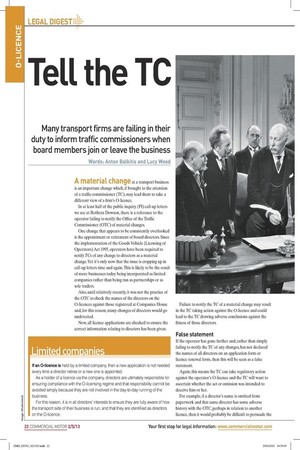Tell the TC Many transport firms are failing in their
Page 15

Page 16

If you've noticed an error in this article please click here to report it so we can fix it.
duty to inform traffic commissioners when board members join or leave the business Words: Anton Balkitis and Lucy Wood A material change at a transport business is an important change which, if brought to the attention of a traffic commissioner (TC), may lead them to take a different view of a firm's 0-licence.
In at least half of the public inquiry (PI) call-up letters we see at Rothera Dowson, there is a reference to the operator failing to notify the Office of the Traffic Commissioner (OTC) of material changes.
One change that appears to be consistently overlooked is the appointment or retirement of board directors. Since the implementation of the Goods Vehicle (Licensing of Operators) Act 1995, operators have been required to notify TCs of any change to directors as a material change. Yet it's only now that the issue is cropping up in call-up letters time and again. This is likely to be the result of more businesses today being incorporated as limited companies rather than being run as partnerships or as sole traders.
Also, until relatively recently, it was not the practice of the OTC to check the names of the directors on the 0-licences against those registered at Companies House and, for this reason, many changes of directors would go undetected.
No all licence applications are checked to ensure the correct information relating to directors has been given. Failure to notify the TC of a material change may result in the TC taking action against the 0-licence and could lead to the TC drawing adverse conclusions against the fitness of those directors.
False statement If the operator has gone further and, rather than simply failing to notify the TC of any changes, has not declared the names of all directors on an application form or licence renewal form, then this will be seen as a false statement.
Again, this means the TC can take regulatory action against the operator's 0-licence and the TC will want to ascertain whether the act or omission was intended to deceive him or her.
For example, if a director's name is omitted from paperwork and that same director has some adverse history with the OTC, perhaps in relation to another licence, then it would probably be difficult to persuade the TC that the operator's failure to mention this director was anything other than deliberate.
Of course, most of the time that the correct directors' names are not given, it is a genuine mistake or misunderstanding but, even at best, this suggests to the TC that the operator is not as aware of its obligations as is expected. It may lead the TC to conclude that if an operator's knowledge is lacking in relation to what needs to be notified to the TC, then their knowledge will also be lacking in other areas.
Background At the very least, it is likely that the TC will want to delve deeper into the operator's background understanding of 0-licensing law to ensure that everything is as it should be.
The same consequences are likely to result if an operator fails to notify the TC of any other material changes such as a change in transport manager or maintenance provider.
However, with the OTC's improved access to information — particularly Companies House details — a change in directors that hasn't been notified is something that is likely to be identified far more quickly. • • If you require further information, contact Anton Balkitis or Lucy Wood at Rothera Dowson Solicitors on 0115 9100 600 or go to keepmeontheroad.co.uk iSLSiII1 sr.iIII If an 0-licence is held by a limited company, then a new application is not needed every time a director retires or a new one is appointed.
As a holder of a licence via the company, directors are ultimately responsible for ensuring compliance with the 0-licensing regime and that responsibility cannot be avoided simply because they are not involved in the day-to-day running of the business.
For this reason, it is in all directors' interests to ensure they are fully aware of how the transport side of their business is run, and that they are identified as directors on the 0-licence. A case last year involved an operator that had applied for its 0-licence some years before Vosa's new system of checking directors was implemented.
The company's application for a licence listed individuals who were not board directors of the company, but nonetheless considered themselves as directors because their job titles included the word 'director' in them.
On the authority of the board, the application was made and it was not until about 15 years later when he received the renewal form check list that one of the company's new directors realised that the directors listed on the 0-licence were incorrect. As such, he crossed out the names of those individuals who were not and had never been directors and put his name as a director of the company. Unfortunately, he also omitted the names of the other board directors, believing that only one director's name was required.
The company was called to a PI where the deputy TO took the ultimate sanction and revoked the company's licence. He did so on the basis that, in his view, it had never been a valid licence as he believed it had been granted without authority from the board. Fortunately, the deputy TC's decision was overturned on appeal and the case remitted to a different TO for consideration. More than a year after the operator was first called to the PI, the second TO chose not to revoke the licence but let the licence continue with a formal warning. Nonetheless, it was a painful and costly lesson to learn for the operator.
Although this was fairly extreme in that none of the correct directors had been identified on the original application form, it does not mean that failing to notify the TO of changes in directors will not be taken seriously.







































